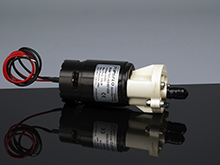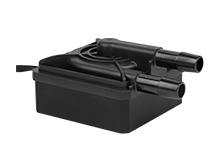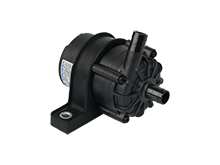Do you know the main parameters of the brushless DC water pumps
2023-08-10
In the industrial and civil sectors, brushless centrifugal pump are widely used as efficient and reliable fluid transportation equipment in various fields such as industry, agriculture, and healthcare. This article provides a detailed introduction to the main performance parameters of brushless DC centrifugal pumps, as well as an interpretation of the labels of TOPSFLO water pumps, to help you better understand and choose brushless centrifugal pumps.
1. Flow rate parameter
Flowrate is one of the important performance parameters of a brushless centrifugal pump. It represents the amount of liquid that the pump can deliver per unit of time. Flowrate can be measured in terms of volume flowrate or mass flowrate.
The volumetric flow rate (Q) refers to the volume of liquid conveyed by the pump in a unit of time, commonly used measure units are litres/minute (L/min), cubic metres/hour (m³/h) and so on. The volumetric flow rate determines the pumping capacity of the pump. For different application requirements, it is necessary to select an appropriate volumetric flow rate based on the liquid delivery needs.
TOPSFLO pumps are usually labelled with the volumetric flow rate and also the maximum flow capacity (Max water flow / Max air flow / Max flow / Max flow without pressure ), which indicates the maximum flow rate that the pump can achieve without actual load pressure. When the outlet of a brushless centrifugal pump is not connected to any pipework, the flow rate will be at its maximum, but no pressure will be generated.
2. Water head parameters
Water head is a key indicator of the performance of brushless centrifugal pumps. It represents the increase in effective energy per unit mass of liquid from the pump inlet to the pump outlet. The water head determines the pumping capacity of the pump and the height or pressure at which the liquid can be delivered.
The water head is measured in meters (m) and represents the height of the liquid column that can be conveyed. However, the water head does not only represent the height of the liquid, it also includes the energy required to overcome fluid resistance and lift both static pressure and kinetic energy. Therefore, the water head is a key parameter for determining the pump's ability to transport liquid.
TOPSFLO pumps are often labelled with a maximum pressure capacity, i.e. open pressure (Max water head/Max pressure/Open pressure/Open pressure/open pressure without flow), which indicates the maximum pressure that the pump can achieve without actual flow. When a brushless centrifugal pump pumps water to a maximum limit point, no further flow will come out.
3. Speed parameter
Speed (n) represents the number of rotations the pump shaft makes per minute, measured in revolutions per minute (r/min). Under constant speed, the flow rate, water head, and power remain unchanged. When the speed changes, the flow rate, water head, and shaft power of the brushless centrifugal pump will also correspondingly change. The selection of speed has an impact on the flow rate, head, and pump efficiency. Different application scenarios require the appropriate speed to be chosen based on specific requirements.
4. Power Parameters
Power indicates the work done by the pump in a unit of time.
Effective power (Ne) represents the work done by the pump on the conveyed liquid in a unit of time, commonly used unit is watt (W) or kilowatt (kW). It can be calculated through the flow rate, water head and liquid density, this is an important indicator of pump efficiency.
The shaft power (N) represents the pump input power, also indicates the power transferred from the prime mover to the pump shaft. The shaft power is usually less than the effective power because there are various losses within the pump that do not allow the input power to be fully converted into the effective power of the liquid. Shaft power is also expressed in watts (W) or kilowatts (kW).
The mating power (ND) is the power of the prime mover that is mated to the brushless centrifugal pump. Its relation to the shaft power can be calculated by a factor. Mating power is usually used to determine the required prime mover power to ensure proper pump operation.
Input electric power (P) is the input power, also indicates the total electric power that the pump obtains from the power supply. The input power includes the electrical energy required to run the pump as well as the motor's own losses. It is usually expressed in watts (W) or kilowatts (kW).
It should be noted that the power indicated on the nameplate of brushless centrifugal pumps is not the effective power, but rather shaft power, rated power, or input power. For example, the power indicated on the TOPSFLO water pump label is the input power.
5. Other Parameters
In addition to flow rate, water head, speed, and power, there are other parameters that need to be considered, such as operating temperature, material corrosion resistance, noise level, etc. These parameters should be selected based on specific application scenarios and requirements.
By understanding the performance parameters of the pump, it is possible to accurately match the characteristics of the pump with the application needs. For example, understanding the flow rate can determine the pump's conveying capacity, allowing the selection of an appropriate flow rate to meet the actual requirements. Understanding the head can determine the pump's delivery height or pressure requirements, ensuring that the pump can provide sufficient lift. Understanding the shaft power and effective power can evaluate the pump's energy conversion efficiency, and selecting a high-efficiency pump can provide greater effectiveness. Having a clear understanding of the performance parameters of the pump also helps in selecting suitable supporting equipment such as motors and controllers, while avoiding the risks of overload and damage.
In conclusion, the performance parameters of brushless centrifugal pumps are of significant importance for correctly selecting and applying pumps. By fully understanding the performance parameters, it is possible to better select a pump that suits the requirements and ensure that it can achieve the best results in practical applications.










.jpg)

